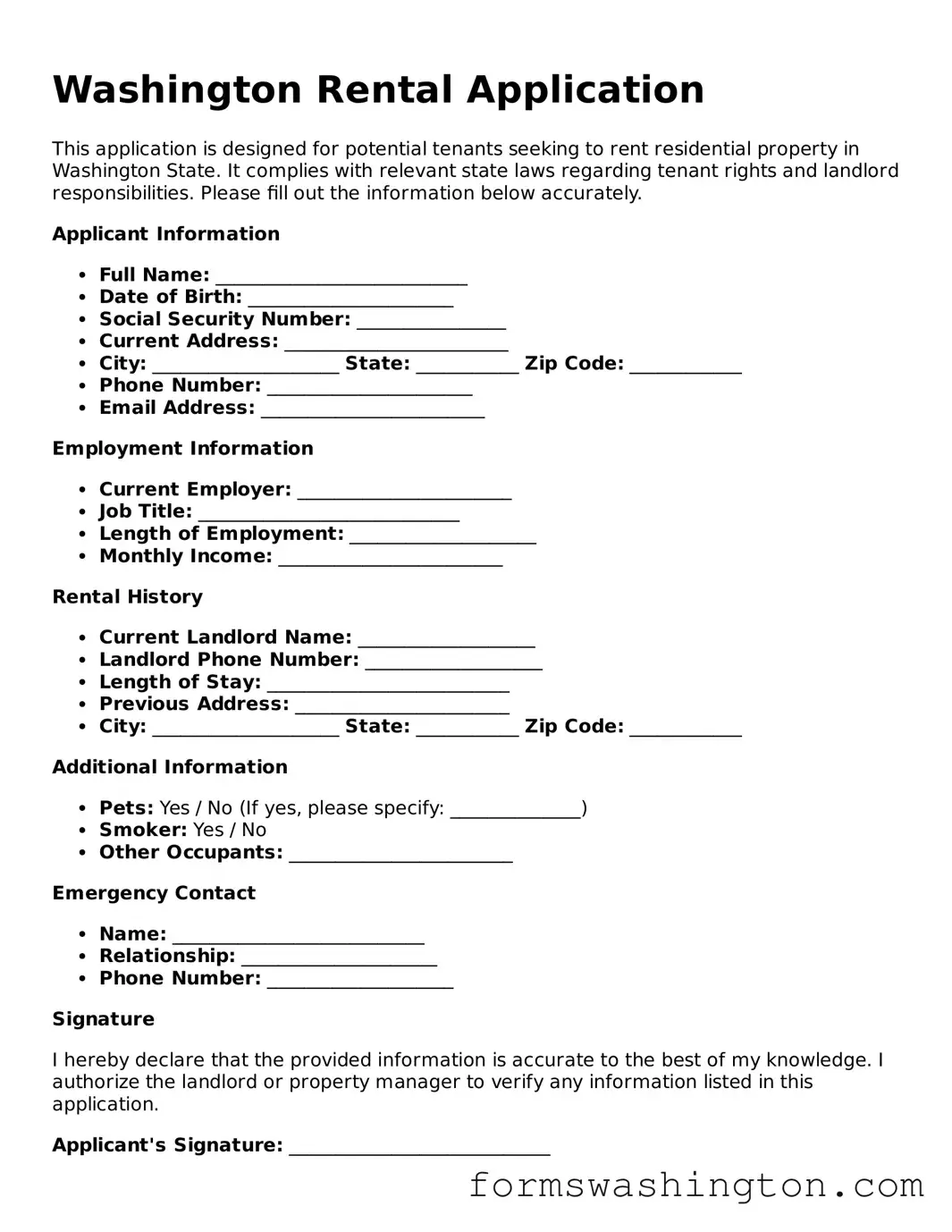Blank Rental Application Template for Washington State
When renting a property in Washington, the rental application form plays a crucial role in the tenant screening process. This form collects essential information about potential tenants, including their personal details, rental history, employment information, and references. Landlords use this information to assess an applicant's suitability for tenancy. The form typically requires applicants to provide their full name, contact information, and social security number, which helps landlords verify identity and conduct background checks. Additionally, applicants may need to disclose their income sources, ensuring they can meet the rental payment obligations. Some forms also include sections for applicants to provide details about their previous rental experiences, such as landlord contact information and reasons for leaving prior residences. By completing the Washington rental application form accurately and thoroughly, potential tenants can increase their chances of securing their desired rental property while landlords can make informed decisions based on the information provided.
Documents used along the form
When applying for a rental property in Washington, a rental application form is just one piece of the puzzle. Several other documents are often required to ensure a smooth application process. Below is a list of common forms and documents that may accompany the rental application, each serving a unique purpose.
- Credit Report: This document provides a detailed account of an applicant's credit history. Landlords use it to assess financial responsibility and the likelihood of timely rent payments.
- Background Check Authorization: This form allows landlords to conduct a background check on the applicant. It typically includes personal information that helps verify identity and check for any criminal history.
- Proof of Income: Applicants often need to submit pay stubs, tax returns, or bank statements. This documentation helps landlords confirm that the applicant has a stable income to cover rent.
- Rental History Verification: This document outlines the applicant's previous rental experiences. It may include references from former landlords, showcasing the applicant's reliability as a tenant.
- Employment Verification: A letter or form from the applicant's employer confirming their job status and income can be crucial. It assures landlords of the applicant's employment stability.
- Dnd Character Sheet: For those engaging in role-playing games like Dungeons and Dragons, having a comprehensive smarttemplates.net is essential for tracking character details such as strengths, weaknesses, spells, and equipment.
- Identification: A government-issued ID, like a driver's license or passport, is often required to verify the applicant's identity. This helps prevent fraud and ensures accurate record-keeping.
- Pet Application: If pets are allowed, a separate application may be required. This document typically outlines pet details, including breed and size, and may include a pet deposit agreement.
Having these documents ready can significantly enhance your chances of securing a rental property. Each form plays a vital role in providing landlords with a comprehensive view of potential tenants, ensuring a safe and mutually beneficial rental experience.
Misconceptions
When it comes to the Washington Rental Application form, several misconceptions can lead to confusion for both landlords and tenants. Here are six common misunderstandings:
-
Only landlords can request a rental application.
Many believe that only landlords have the right to ask for a rental application. In reality, potential tenants can also request one to understand the requirements and expectations of the rental process.
-
All rental applications are the same.
Some assume that every rental application form is identical. However, different landlords or property management companies may have unique forms tailored to their specific needs and criteria.
-
A rental application guarantees approval.
Many applicants think that submitting a rental application ensures they will get the rental. Approval depends on various factors, including credit history, income verification, and landlord references.
-
Rental applications are only for new tenants.
Some people believe that rental applications are only necessary for first-time renters. In fact, current tenants may also need to fill out a new application when renewing a lease or moving to a different unit.
-
There is no fee for submitting a rental application.
Many applicants are surprised to learn that some landlords charge a fee for processing rental applications. This fee typically covers the cost of background checks and credit reports.
-
Once submitted, the application cannot be changed.
Some individuals believe that the information on a rental application is set in stone. However, applicants can often update or correct information before the landlord makes a decision.
Understanding these misconceptions can help both landlords and tenants navigate the rental process more effectively.
Check out Some Other Templates for Washington
Washington State Rental Agreement - Specifies insurance requirements for both parties.
Washington State Lease Agreement - The lease agreement should clearly define property boundaries and portions rented.
Understanding the importance of a "Living Will" can greatly impact your healthcare decisions. By preparing this essential document, you ensure that your wishes regarding medical treatment are honored, especially when you cannot voice them. To learn more about this process and take the necessary steps, visit the guide on how to create a Living Will.
Promissory Note Washington State - This document is often a requirement for securing a personal loan from financial institutions.
Dos and Don'ts
When filling out the Washington Rental Application form, it’s important to approach the process carefully. Here are some key dos and don’ts to keep in mind:
- Do provide accurate information. Landlords rely on this data to assess your application.
- Do include all necessary documentation, such as proof of income and identification.
- Do read the application thoroughly before submitting. Understanding each section can prevent mistakes.
- Do be honest about your rental history. Transparency can build trust with potential landlords.
- Don't leave any sections blank. Incomplete applications can lead to delays or rejections.
- Don't provide false information. Misrepresentation can have serious consequences, including eviction.
